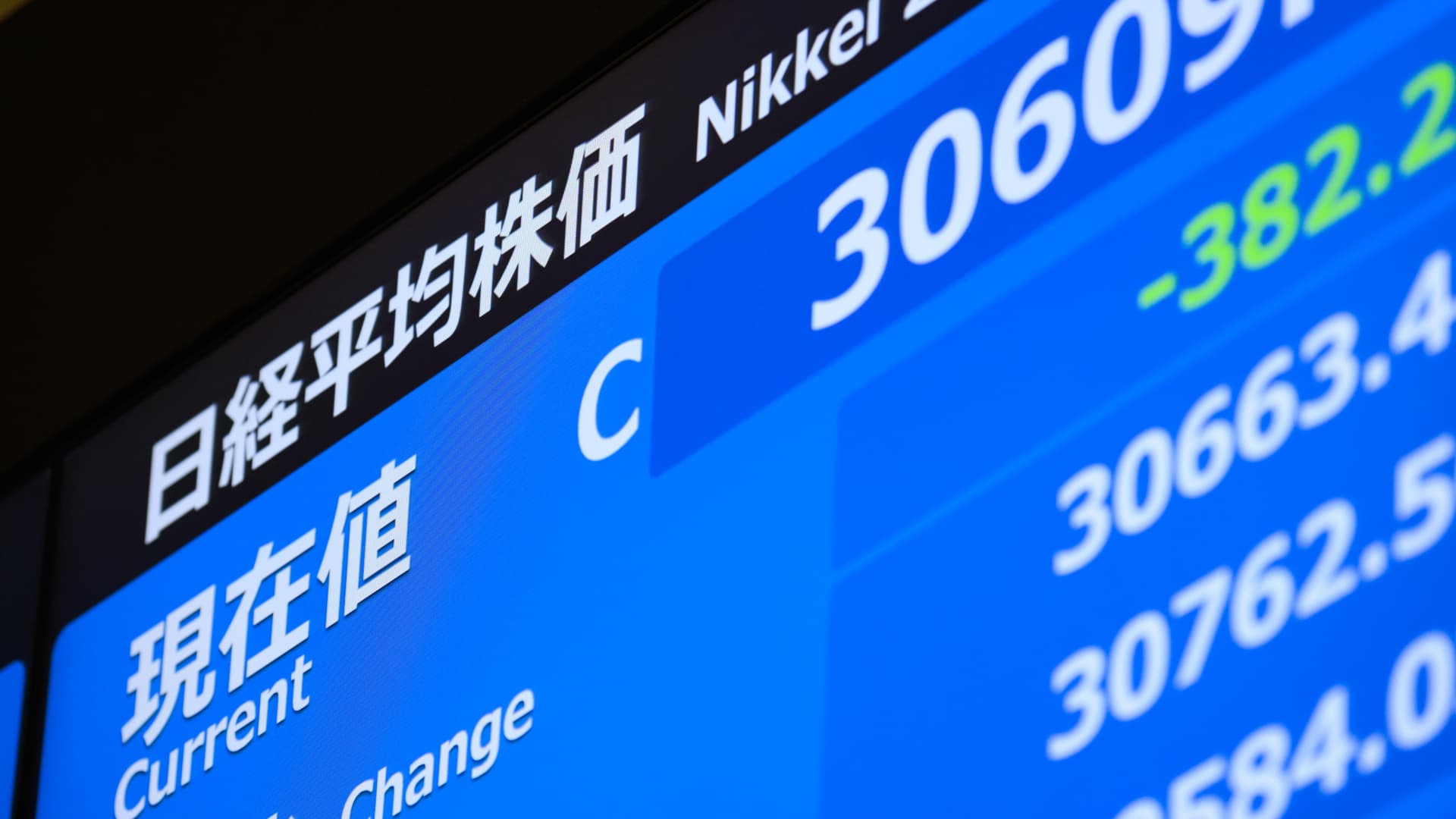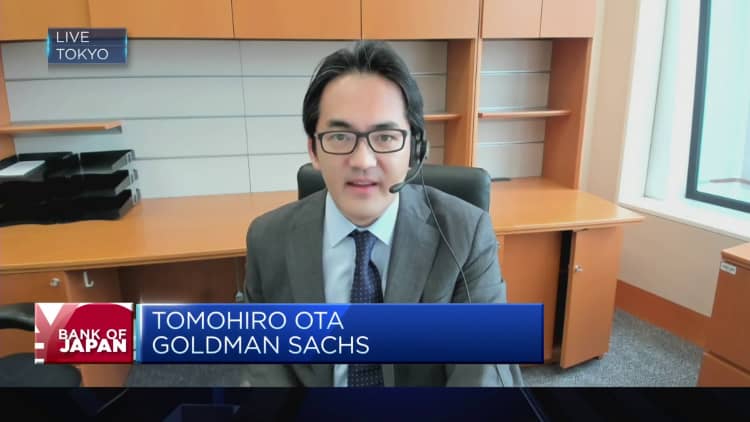
A screen displays the Nikkei 225 Stock Average figure at the Tokyo Stock Exchange (TSE), operated by Japan Exchange Group Inc. (JPX), in Tokyo, Japan, on Monday, Oct. 30, 2023. The expansion of Israel’s ground operations in Gaza added more pressure to global markets as investors prepare for a busy week packed with major central bank decisions and a high-stakes announcement of US bond sales. Photographer: Akio Kon/Bloomberg via Getty Images
Bloomberg | Bloomberg | Getty Images
Asia markets saw a volatile year in 2023, with inflation, rising interest rates and China’s sputtering recovery dragging down growth last year.
Japan’s Nikkei 225 led the region in terms of market performance in 2023, and gained about 28% last year, according to data from Refinitiv. Japanese stocks have been supported by improving corporate results, as well as growing optimism that the Bank of Japan may finally end its ultra easy monetary policy after decades of near-zero interest rates.
On the other hand, Hong Kong’s Hang Seng Index was the worst major performer in the region, having had four straight years of declines after losing nearly 14% in 2023.
Highlighting China’s underwhelming recovery is also the performance of the CSI 300, which measures the largest companies listed in Shanghai and Shenzhen, was the third worst performing stock market in Asia, losing 11.38% last year.
China’s post-reopening was “dismal” due to a property downturn and local government debt issues, which hurt spending and dampened demand and investment in the manufacturing sector, PhilipCapital’s research manager Peggy Mak told CNBC.
Despite this, the outlook for Asia is still bright, according to analysts from Pinebridge Investments.
They see continued strong growth momentum from Asia, as well as a “relatively promising outlook,” which they say should provide attractive potential for selective equity investors in 2024.
“Asia’s two biggest economies cannot be overlooked. While China requires a patient, company-specific investment focus as the economy gradually stabilizes, India is surging ahead across multiple sectors – assuming investors keep an eye on heady valuations.”
Their view is supported by the International Monetary Fund, which expects a growth rate of of 4.6% in 2023 and 4.2% in 2024 for Asia, compared to a global growth forecast of 3% in 2023 and 2.9% in 2024. This is according to Krishna Srinivasan, the IMF’s director for the Asia and Pacific region.
“Surprises abounded in 2023, from China’s underwhelming post-Covid recovery to the strength of the U.S. economy, the promise of artificial intelligence, and a no show global recession,” said Michael Strobaek, chief investment officer at Lombard Odier, in his 2024 market outlook.
Beyond 2023, here’s what investors are looking for in 2024.
Lower rates
Rate cuts will be front and center on investors’ minds.
The U.S. Federal Reserve has laid out a roadmap for cutting rates, with the so-called “dot plot” implying rates will be cut by 75 basis points in 2024, and 100 basis points in 2025.
Central banks in Asia and around the world tend to follow the Fed’s lead.
Rate hikes in major Asia economies have mostly stopped, although banks like the Reserve Bank of Australia still warn they are prepared to take further action to bring inflation to heel.
Southeast Asia’s central banks have largely held rates steady and are no longer raising interest rates aggressively, even though banks like the Philippines’ central bank are still hawkish.

The only exception is the Bank of Japan, where investors will be watching to see if the central bank will exit its negative interest rate policy.
Headline inflation in Japan is above the BOJ’s 2% target for over 19 months and will see a 5% rise in spring wage negotiations guided by the Japan Trade Union Confederation. These conditions are supportive for a policy normalization, said Homin Lee, senior macro strategist at Lombard Odier.
Lee expects the BOJ to hike rates to 0% in 2024 (from the current negative 0.1%) as well as a “gradual end” to the bank’s 1% cap on 10-year Japanese government bonds, “especially now that the daily pledge to defend the cap with unlimited purchases have been removed.”
Pockets of growth
As inflation eases and interest rates come down, where will the growth sectors be?
Hebe Chen, market analyst at IG International, said 2024 is likely to see normalizing inflation rates and moderating economic growth, which will benefit the infrastructure and real estate sectors. By extension, she said, this will benefit the energy sector and commodities, as well as industries that power the AI revolution.

More specifically, she is is bullish on real estate investment trusts and tech in Asia.
As interest rates drop, REITs will provide more funding options and enable asset acquisitions or asset recycling — where REITs divest a property and use the funds to reinvest. That will ultimately push real returns higher for REIT investors.
Separately, Chen said a potential upswing in the global tech cycle is taking shape, and Taiwan, Vietnam, and Singapore could outperform due to their higher concentration of manufacturing and R&D facilities.
That’s because Vietnam, Singapore, and Malaysia — manufacturing hubs often tapped to minimize dependency on China — are now producing for markets outside China. As such, they may no longer be as vulnerable to a Chinese downturn.
The heightened uncertainty and anxiety, unavoidably fueled by the swiftly evolving international landscape and the critical point in the China-US relations, will not make it easy for global investors to find their solace.
Hebe Chen
Market Analyst, IG International
Chen expects a “potential change” for Chinese stocks in 2024, even though they underperformed in 2023.
The world’s second largest economy will likely see a modest recovery, supported by measures from the central government and an improving exports outlook, she said, adding a global tech recovery would likely contribute to an improvement in Chinese exports.
Geopolitics and elections
Geopolitical developments will also be closely watched.
Elections in Taiwan, India, and the U.S. are poised to bring about “dramatic changes in the economic and diplomatic dimensions of the Asia-Pacific (APAC) region,” Chen said.
“The heightened uncertainty and anxiety, unavoidably fueled by the swiftly evolving international landscape and the critical point in the China-US relations, will not make it easy for global investors to find their solace,” she said.

Mak from PhilipCapital said the elections in Taiwan will be the geopolitical event to watch, saying that “how China reacts to the election results, especially if the pro-independence [Democratic Progressive] party retains control, could impact the recent warming of ties with Europe, its key trading partner.”
The U.S. elections next year will also be in focus.
If former president Donald Trump returns to the White House, she said. Investor confidence could potentially be eroded and equity markets affected, due to uncertainties over U.S. trade policies and fiscal spending, she explained.
